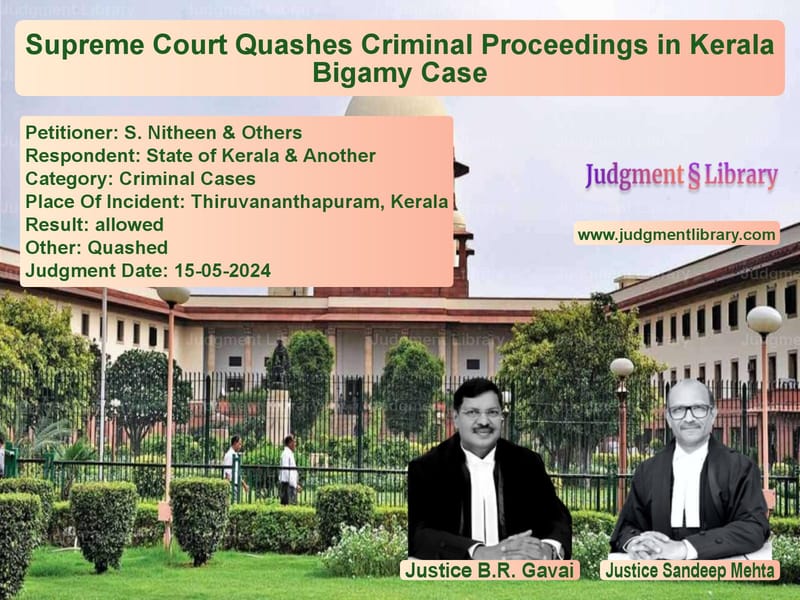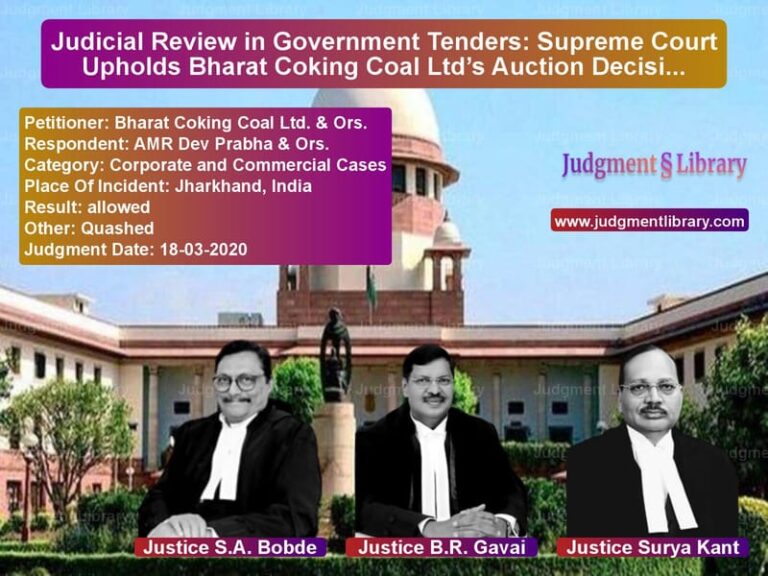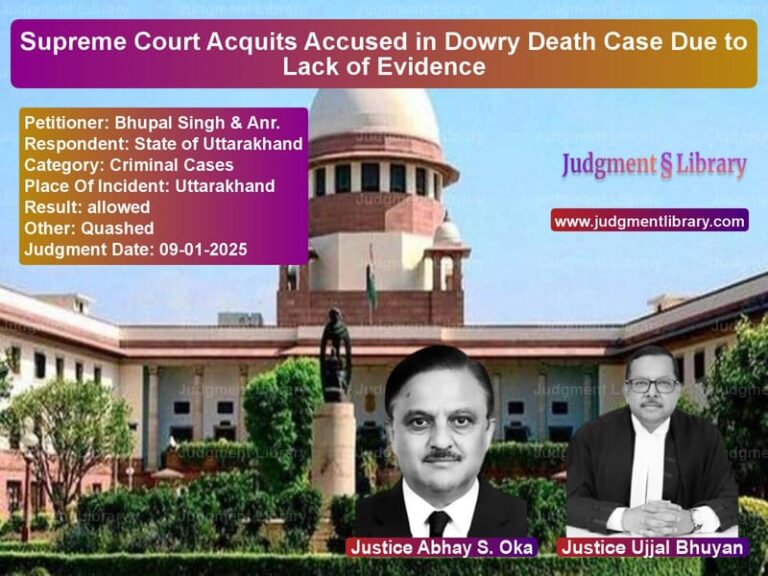Supreme Court Quashes Criminal Proceedings in Kerala Bigamy Case
The Supreme Court of India recently quashed the criminal proceedings against five accused individuals in a bigamy case, ruling that there was no evidence to support their prosecution under Section 494 IPC. The case, S. Nitheen & Others v. State of Kerala & Another, involved allegations that a woman, already married, had entered into a second marriage, with the accused allegedly aiding the act.
Background of the Case
The case originated from a complaint filed by Reynar Lopez (Respondent No. 2), alleging that his legally wedded wife, Lumina (A-1), had entered into a second marriage with Saneesh (A-2) while their marriage was still legally valid. The alleged second marriage was conducted on August 13, 2010, under the Special Marriage Act, 1954, before the Marriage Officer in Nemom, Kerala.
Read also: https://judgmentlibrary.com/supreme-court-quashes-criminal-case-in-tamil-nadu-land-fraud-dispute/
The complainant alleged that the accused:
- Flory Lopez (A-3) (mother of A-1) and Vimal Jacob (A-4) (brother of A-1) were aware of the first marriage but failed to prevent the second marriage.
- S. Nitheen (A-5), P.R. Sreejith (A-6), and H. Gireesh (A-7), who were friends of A-1 and A-2, acted as witnesses to the second marriage.
The Judicial Magistrate First Class (JMFC), Attingal, framed charges under Section 494 IPC (Bigamy) and Section 34 IPC (Common Intention) against all the accused on May 28, 2018. The accused challenged this order before the Sessions Court and later the Kerala High Court, but both dismissed their petitions. The matter was then brought before the Supreme Court.
Key Legal Issues
- Whether the accused (A-3 to A-7) could be prosecuted for bigamy under Section 494 IPC, despite not being direct parties to the second marriage.
- Whether the charge under Section 34 IPC (Common Intention) was applicable to the accused.
- Whether the lower courts erred in refusing to quash the proceedings.
Arguments by the Appellants (Accused)
- The prosecution failed to establish that the accused had any role in solemnizing or facilitating the alleged second marriage.
- There was no evidence to show that A-3 and A-4 were even present at the second marriage.
- A-5, A-6, and A-7 were merely friends of A-1 and A-2 and acted as witnesses without knowledge of the previous marriage.
- Section 494 IPC applies only to a spouse who remarries, and not to family members or friends unless they actively abetted the crime.
Arguments by the Respondents (State of Kerala & Complainant)
- A-3 and A-4, as close relatives of A-1, were aware of her first marriage and should have prevented the second marriage.
- A-5, A-6, and A-7 knowingly participated in the solemnization of an illegal marriage, making them culpable under Section 34 IPC.
- The charge should not be quashed at the preliminary stage, and the trial should proceed to determine guilt.
Supreme Court’s Observations
The bench, comprising Justices B.R. Gavai and Sandeep Mehta, examined the evidence and ruled:
- Section 494 IPC applies only to the spouse who remarries and does not extend to relatives or friends unless they abetted the offense.
- “A bare perusal of the penal provision would indicate that no person other than the spouse to the second marriage could have been charged for the offense punishable under Section 494 IPC simpliciter.”
- The complainant failed to provide any evidence that A-3 and A-4 were present at the second marriage or had any role in facilitating it.
- For A-5, A-6, and A-7, there was no evidence that they had knowledge of A-1’s prior marriage before witnessing the second marriage.
The Court relied on previous judgments, including:
- Gopal Lal v. State of Rajasthan (1979) 2 SCC 170: Holding that only the spouse entering into a second marriage can be prosecuted under Section 494 IPC.
- Chand Dhawan v. Jawahar Lal (1992) 3 SCC 317: Clarifying that other individuals cannot be implicated in bigamy charges unless active participation is proven.
Final Judgment
- The Supreme Court quashed the criminal proceedings against A-3 to A-7.
- The trial against A-1 (Lumina) and A-2 (Saneesh) would continue.
- The appeals were allowed, and the impugned High Court and lower court orders were set aside.
- No costs were awarded, meaning both parties would bear their own legal expenses.
Implications of the Judgment
- The ruling clarifies that only the spouse entering a second marriage can be prosecuted under Section 494 IPC.
- It prevents unnecessary prosecution of family members and friends unless clear abetment is established.
- The judgment reinforces that criminal law cannot be misused to implicate individuals without substantial evidence.
Conclusion
The Supreme Court’s decision in S. Nitheen & Others v. State of Kerala provides clarity on bigamy laws in India. The judgment ensures that innocent individuals are not dragged into criminal cases without clear evidence and upholds the principle that only the spouse who remarries is liable under Section 494 IPC.
Petitioner Name: S. Nitheen & Others.Respondent Name: State of Kerala & Another.Judgment By: Justice B.R. Gavai, Justice Sandeep Mehta.Place Of Incident: Thiruvananthapuram, Kerala.Judgment Date: 15-05-2024.
Don’t miss out on the full details! Download the complete judgment in PDF format below and gain valuable insights instantly!
Download Judgment: s.-nitheen-&-others-vs-state-of-kerala-&-an-supreme-court-of-india-judgment-dated-15-05-2024.pdf
Directly Download Judgment: Directly download this Judgment
See all petitions in Fraud and Forgery
See all petitions in Bail and Anticipatory Bail
See all petitions in Other Cases
See all petitions in Judgment by B R Gavai
See all petitions in Judgment by Sandeep Mehta
See all petitions in allowed
See all petitions in Quashed
See all petitions in supreme court of India judgments May 2024
See all petitions in 2024 judgments
See all posts in Criminal Cases Category
See all allowed petitions in Criminal Cases Category
See all Dismissed petitions in Criminal Cases Category
See all partially allowed petitions in Criminal Cases Category







